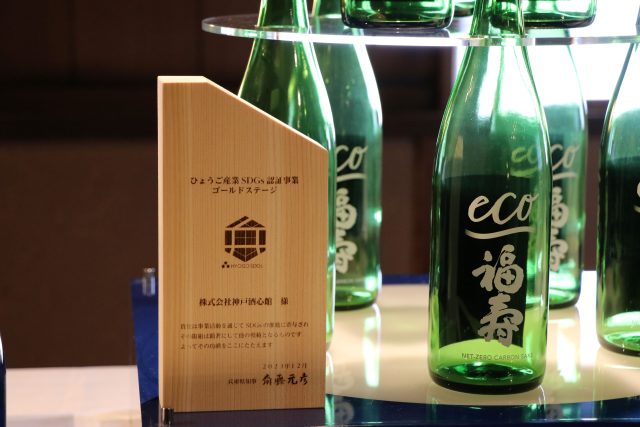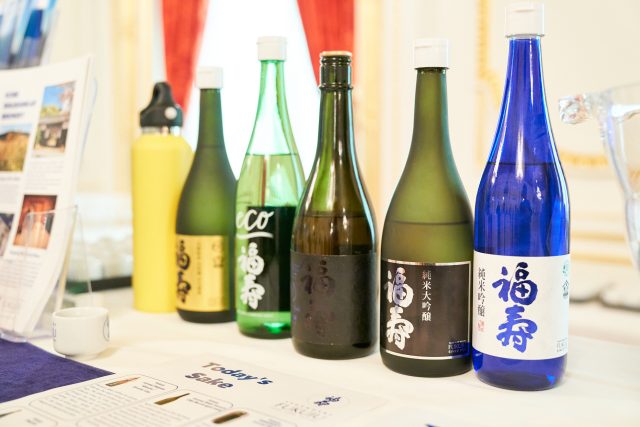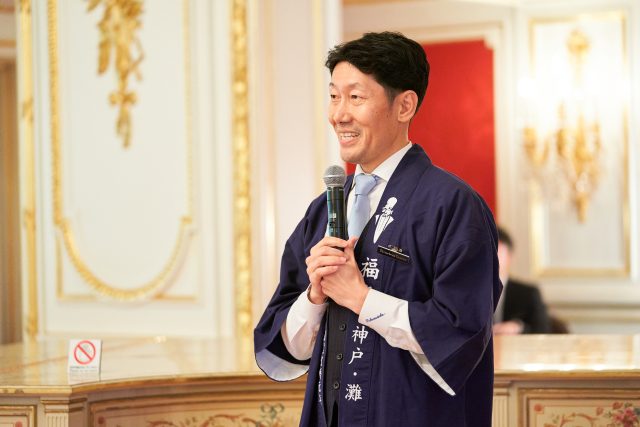This website uses cookies so that we can provide you with the best user experience possible. Cookie information is stored in your browser and performs functions such as recognising you when you return to our website and helping our team to understand which sections of the website you find most interesting and useful.
Fukuju Brewery: the virtues of sustainability in uncertain times
How does an ancient industry adapt to the biggest contemporary challenges? Fukuju Brewery provides answers in its sustainability initiatives.

Even as a producer dating back to 1751, Fukuju Brewery is keenly aware of the importance of sustainability in the current market. It has become central to the company’s mission, as a result of which it has been recognised by the drinks business Green Awards and by local government.
It recently achieved ‘Gold Stage’ certification from the Hyogo Industry SDGs Certification Programme, which recognizes companies engaged in sustainable development goal (SDG) related activities and encourages them to deepen their efforts.
Launched in August 2023 by Hyogo Prefecture, the programme is the first of its kind in the Kinki Region. Candidate companies are assessed across 30 environmental, social, and economic criteria, and Fukuju Brewery, also known as Kobe Shushinkan, checked all the boxes and was among the first cohort to receive the highest certification, ‘Gold Stage’, on 5 December 2023.
Fukuju Brewery’s wide-ranging sustainability initiatives show a clear ethical commitment to the environment and communities. However, they also act as both protection and promotion of its centuries of practice.
Its ‘Green Initiative’ programme is protective as climate change could substantially affect sake production. Rising temperatures, for instance, affect the rice grain’s development and reduce quality, while unpredictable weather events can devastate a crop.
However, as more customers look to sustainability as a signifier of luxury, the initiatives are also opening new opportunities. With ethical, protective and economic reasons to pursue them, sustainability initiatives are now embedded in the brewery’s practice.
‘Green Initiative’: a rounded sustainability programme

Part of the comprehensive environmental sustainability programme has been to maximise efficiency. Even as production tripled between 2010 and 2017, energy consumption fell by 12% thanks to equipment upgrades. Moreover, its choices of renewable energy and carbon neutral gas made Fukuju the world’s first net zero sake brewery.
Further efficiency drives have targeted water and recycling. Innovative bubble-jet technology for washing rice, coupled with recycling water for bottle washing, has dramatically reduced water consumption.
Fukuju Brewery has also scrapped its unrecyclable bottles. Switching its blue bottles to UV-protecting, fully recyclable clear versions should allow 450,000 bottles to be recycled each year. It has now set a further target to switch to 100% recyclable packaging materials.
On a local scale, Fukuju Brewery’s sustainability initiatives are protecting its landscape and biodiversity. Its region’s heritage is being protected, for instance, in funding Toyooka’s stork fund, which is returning breeding pairs of the oriental stork to Japan. There are also plans to restore historically important terraced rice fields in Kobe’s Kita Ward.
Modern technology has its uses too. Innovative monitoring technologies are protecting the land, preventing unnecessary agricultural interventions. Fukuju Brewery has even pioneered using drones to identify which plants need fertilisers, avoiding potential damage from overuse.
As a final strand of its sustainability initiatives, Fukuju Brewery has dedicated resources to protecting communities. Given the risks of natural disasters in Japan, it is working with local partners to safeguard those living nearby.
In practice, this means sharing resources in the event of a disaster. The brewery has a collaboration agreement with Nissan Motors and Kobe City which would see the three parties provide electricity, water and electric vehicle transportation to locals. Its role is essential, as the 72,000 litre capacity water tank, housed in an earthquake-resistant building, would supply drinking water.
The advantages of ‘sustainable luxury’
Beyond their inherent value, these comprehensive sustainability initiatives are offering new market opportunities for the brewery. Although sake exports are at historically high levels, domestic consumption is well below its 1970s peak. The industry therefore must prioritise new ways to reach customers. As more drinkers consider the ethics of their consumption, sustainability has become a signifier of quality and luxury, and therefore an important selling point for any brand.
Fukuju Brewery’s sustainable luxury credentials were recently on show, when it featured in an exclusive experience titled ‘Timeless Tastes’. The one-day excursion saw 36 visitors chauffeured to the Akasaka Palace in Tokyo for a banquet and cultural event. The neo-baroque building, a former royal palace, has a floorplan of 15,000m² and is now one of Japan’s two state guest houses.
Once there, they were presented with the very finest in Japanese culture. The programme included Noh theatre, a meal prepared by three Michelin-starred chefs and wagashi (Japanese confectionery) by a 19th generation producer.

Fukuju Brewery was selected to showcase its award-winning sakes at the prestigious showcase. Takenosuke Yasufuku, the 13th generation owner of the company, presented them in the stunning Hagoromo no Ma (the Robe of Heaven’s Hall). The brewery’s long-standing work in sustainability, alongside its renowned quality, was a key determining factor in its selection for the event.
The event is just one indication that a focus on sustainability is providing new business opportunities. As its awards and recognition demonstrate, Fukuju Brewery is leading the way in sustainability. With economic opportunities emerging as a direct result, many producers may want to follow that lead.

